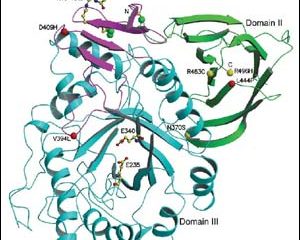
Discovery may help design effective therapies for the genetic disease that mainly affects Ashkenazi Jews
An interdisciplinary team of Weizmann Institute scientists has solved the three-dimensional structure of an enzyme called glucocerebrosidase. Mutations occurring in this enzyme cause Gaucher disease, a genetic illness that mainly affects Ashkenazi Jews. The Institute study, published recently in EMBO Reports, may lead to the design of effective new therapies for treating the disea

University of Pittsburgh researchers report results of first U.S. comparison study at the American Transplant Congress
A new organ preservation solution offers comparable results to a solution currently in widespread use but it is more cost-effective and has several logistical advantages that makes it more practical for keeping donated livers viable before being transplanted, conclude University of Pittsburgh Medical Center (UPMC) researchers who performed the first U.S. study to comp

Most breast cancer patients with more than 10 nodes that are affected by the cancer have a poor prognosis, yet some survive long-term. Physicians now believe that certain genes in the breast cancer tissue, removed at diagnosis, can help them predict which patients will survive.
With this information, doctors can recommend the most appropriate therapy for an individual patient, for example sparing a woman with a poor prognosis the rigors that accompany aggressive chemotherapy, and enabling h

Scientists from the RIKEN Tsukuba Institute (Japan) have developed a valuable new experimental system for tissue-specific RNAi knockdown in mammalian cells and organisms – a discovery that will markedly advance the functional characterization of genes involved in development and disease.
Discovered in the late nineties, RNA intereference (RNAi) refers to the introduction of double-stranded RNA (dsRNA) into a cell, where it induces the degradation of complementary mRNA, and thereby suppresse

Explores abandoned mine
Carnegie Mellon University researchers, working with the Pennsylvania Department of Environmental Protection (DEP) and the U.S. Department of Labor’s Mine Safety and Health Administration (MSHA), will demonstrate a prototype, autonomous wheeled robot today as it explores and maps a 3,500-foot corridor of an abandoned coal mine near New Eagle in southwestern Pennsylvania.
Named Groundhog, the robot was developed by students in the Robotics Institut

The future of proteomics is in good hands with one of the most powerful and versatile mass spectrometers being developed by scientists and engineers from the William R. Wiley Environmental Molecular Sciences Laboratory.
The high-throughput Fourier transform ion cyclotron resonance (FTICR) mass spectrometer and automated liquid chromatography (LC) system is a breakthrough in mass spectrometry capable of improving the understanding of protein production, function and interactions at the cellul

– new calculation confirms standard model of particle physics. Contribution of hadronic vacuum polarization determined with unprecedented accuracy. The magnetic moment of the muon is an important precision parameter for…
Technique may prevent formation of unwanted waves that siphon off needed energy. Heating plasma to the ultra-high temperatures needed for fusion reactions requires more than turning the dial on a…

An international team of astronomers, led by researchers from the Astronomical Observatory of the University of Warsaw, have identified a new class of cosmic X-ray sources. The findings have been…

How deubiquitinases USP53 and USP54 cleave long polyubiquitin chains and how the former is linked to liver disease in children. Deubiquitinases (DUBs) are enzymes used by cells to trim protein…

Conceptual blueprint to analyze experimental catalyst data. Machine learning (ML) models have recently become popular in the field of heterogeneous catalyst design. The inherent complexity of the interactions between catalyst…

Antibody that Neutralizes Inhibitory Factors Involved in Nerve Regeneration Leads to Enhanced Motor Function after Acute Spinal Cord Injury. Researchers at 13 clinics in Germany, Switzerland, the Czech Republic and…

How simulations help manufacturing of modern displays. Modern materials must be recyclable and sustainable. Consumer electronics is no exception, with organic light-emitting diodes (OLEDs) taking over modern televisions and portable…

“Neurons that fire together, wire together” describes the neural plasticity seen in human brains, but neurons grown in a dish don’t seem to follow these rules. Neurons that are cultured…

The quest for sustainable energy solutions has been a major focus of scientific research for decades. Solar energy, a clean and renewable source, has emerged as a promising alternative to…

With a processing speed a billion times faster than nature, chip-based laser neuron could help advance AI tasks such as pattern recognition and sequence prediction. Researchers have developed a laser-based…

New technology could remotely identify various types of plastics, offering a valuable tool for future monitoring and analysis of oceanic plastic pollution. Researchers have developed a new hyperspectral Raman imaging…

Artificial Intelligence (AI) has established a strong presence across industries, large and small. The “VoBaKI” research project has empowered small and medium-sized enterprises (SMEs) with an innovative tool to independently…